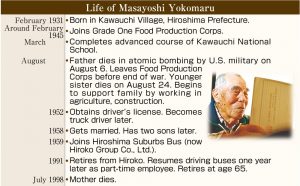Documenting Hiroshima, Witnesses to horrors of atomic bombing: Masayoshi Yokomaru, Working nonstop, farm work, daywork
Mar. 13, 2025
Mother finds comfort in memorial service held on 6th of each month
by Michiko Tanaka, Senior Staff Writer
“Not just those who experienced the atomic bombing, but everyone in Kawauchi went through hardships,” said Masayoshi Yokomaru, 94, who lives in the Kawauchi area in Hiroshima’s Asaminami Ward, thinking back to the lives of people after the war. On August 6, 1945, the Kawauchi Village Volunteer Corps, which had been mobilized to work near the hypocenter, was completely destroyed. More than 70 women in the village were widowed, losing the families’ breadwinners. Mr. Yokomaru’s mother, Tsuyuko, was one of them.
“Back then, we were forced to do anything for the country,” said Mr. Yokomaru. “Even if you didn’t want to, there was no choice. It was wartime.” In fact, he himself was assigned a task.
Due to food shortages, the government organized the Grade One Food Production Corps, commonly known as the Farmer Corps, in each prefecture in 1944. In February 1945, just before completing the advanced course of Kawauchi National School (now Kawauchi Elementary School), Mr. Yokomaru was told by his homeroom teacher that he would be part of the second cohort of the corps. He headed for the Hiroshima Prefectural Training Farm (now the Hiroshima Prefectural Agricultural Technical College in the city of Shobara).
Many teenage boys from the rural areas of the prefecture were assembled there. They marched, recited the Imperial Rescript to Soldiers and Sailors. After the training that was just like those for soldiers, Mr. Yokomaru’s group was sent to the former Kabe and Tomo towns. They spent day after day breaking ground with a farming tool called a cultivation hoe. They were greatly annoyed by fleas in their accommodations.
The night before the atomic bombing, Mr. Yokomaru happened to be in Kawauchi, as he had gone home for a while because of a health problem. When he woke up before dawn of August 6, he saw his father, Masaru, before he left to work as a member of the volunteer corps. He was 43 years old at that time. He made a living by laying foundations of buildings while working in the fields. That was the last time he saw his sturdy father.
Tsuyuko desperately searched for her husband, but she was unable to find even his remains. Although she put on a brave face, her baby daughter grew weaker day by day. When she died suddenly on August 24, Tsuyuko could not hold back her tears. She expressed her true feelings in a 1982 book edited by the late folklorist Mikio Kanda titled Genbaku ni Otto wo Ubewarete (Widows of Hiroshima: The Life Stories of Nineteen Peasant Wives), collection of accounts of the lives of women in Kawauchi.
“Kiyoko’s life was short, only one year or so. She died because of things we didn’t understand. Later, I thought she had died because the radiation and poison from my milk entered her body.”
She worked hard, growing rice, millet and potatoes, as if to shake off the sadness of losing her family members one after the other. “Just think of it! How would you feed four boys with big appetites? ... There’s no one in this village who was as hard up as I was,” she said according to the book. During the off-season on the farm, she worked as a day laborer, joining men at construction sites. She also did hard work, such as wading in muddy water and cutting cattails used for matting.
Mr. Yokomaru left the food production corps before the end of the war to support his family. He would get up in the middle of the night and walk 10 kilometers to the town to collect night soil, wearing out two pairs of straw sandals his mother had made for him in one go. He also worked on embankment repair work to earn 0.8 yen a day. Even when the country was booming with special procurement after the Korean War broke out in 1950, “It didn’t make things any easier at all,” for him. After working in construction and as a truck driver, he settled down as a bus driver at the age of 28.
His mother never complained. Mr. Yokomaru believes his mother found comfort in attending the memorial service held on the 6th of each month and meeting other women in the same situation. Mr. Yokomaru retired from work and took care of his mother until her death. Then he began to attend the memorial service.
While joining his hands in prayer, he remembers how her mother worked. “The war made her suffer. I couldn’t do much for her.” In the book of survivors’ accounts, Ms. Yokomaru told of a “happy event” that took place in 1958: “Masayoshi got married. I can finally live freely and comfortably.” The mother and son went through the post-war period, caring for each other.
(Originally published on March 13, 2025)










